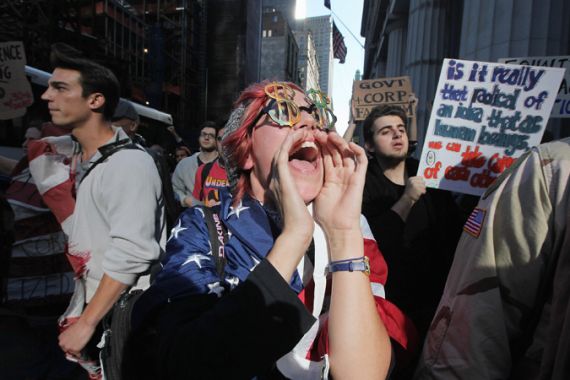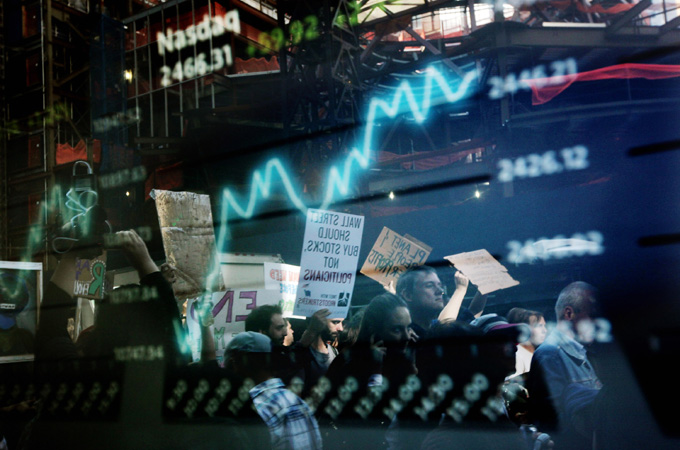Is politics from below ‘class warfare’?
Americans are slowly waking up from their passive state and speaking out against greed, corruption, and predatory wars.

 |
| The protests erupting across the country speak to the disillusionment with America’s politics [GALLO/GETTY] |
The exciting presence and perseverance of protestors on Wall Street (and the spread of the #OccupyWallStreet protests to cities throughout America) is a welcome respite from years of passivity, and not only in relation to the scandalous legal and illegal abuses of comprador capitalists.
In addition, it is a reaction to the prolongations of predatory wars in Iraq and Afghanistan, to a rising anti-democratic Islamophobic tide, to a shameless reliance on incarceration for harmless activities, to a presidency that seems less willing to confront hedge fund managers than jobless masses, and to a Congress that incredibly represents billionaires while scorning the people that put them in office.
But will this exhilarating presence be sustained in a manner that brings credible hope of restored and renewed democracy that is dedicated to social well-being at home and responsible law-oriented leadership abroad that is no longer drone-driven?
|
“Obama’s electoral victory in 2008 was the last hope of the young in America.“ |
There is little doubt that this move to the streets of America expresses a deep disillusionment with ordinary politics based on elections and governing institutions. Obama’s electoral victory in 2008 was the last hope of the young in America who poured unprecedented enthusiasm into his campaign that promised so much and delivered so little. Perhaps worse than Obama’s failure to deliver, was his refusal to fight for what he claimed to believe, or even to bring into his entourage of advisors a few voices of empathy and mildly progressive outlook.
From his initial appointment of Rahm Emmanuel onwards, it should have been clear that the Obama presidency was intent on playing the same old Washington games waged by special interests. More recently, these interests were further deformed by a Republican Party lurching to the right, by a surging Tea Party intent on pushing the government policy and role to the outer extremes of cruel and irresponsible public policy, by a pathetic Democratic Party that is trying to survive mainly by mimicking Republicans, and by a domineering media that has become largely captive to corporate America.
If such a portrayal of ordinary politics is more or less correct it is a wonder that a more radical sense from the left of America’s future took so long to materialise, if indeed it has. At least #OccupyWall Street is displaying the distress of young urban Americans and sending some warning signals to the bastions of the established power that acute displeasure is rising, and may become threatening to what is, as well as engaging with what might be.
Far right radicals
Of course, radicalism is not absent from the American political scene. Ever since the end of the Cold War, the forces of the right have been riding higher in the United States.
Such an impression is strengthened by the loss of composure by the Democratic party that struggles to show that it is almost as capitalist, pro-military, anti-tax, anti-immigrant, and patriotic as its reactionary critics. Its traditional principles of a compassionate state serving the interests of the citizenry have been put in cold storage. Democrats are scared to seem weak, and even more scared to seem to be socialists.
|
“One serious cost of the collapse of the Soviet Union was to discredit efforts by government to care for the health, education and wellbeing of less advantaged people in the country.“ |
One serious cost of the collapse of the Soviet Union was to discredit efforts by the government to care for the health, education, and well-being of less advantaged people in the country. Thus the Wall Street protests, if indeed they do have a radical agenda, which is not yet clear, will be to fill this vacuum on the left that has been so disabling during the last twenty years when capitalism had no ideological rival.
One amusing legacy of Cold War anti-Marxism is for the reactionary legions in the country to complain that the protesters are intent on launching ‘class warfare.’ It is one of those post-liberal epithets that gets promiscuously tossed around by ascendant right wing ideologues so as to demonise even those who are reckless enough to propose a modest tax increase on the super-rich in America.
Even Barack Obama who has done his best to please Wall Street 99 per cent of the time, is being charged with waging ‘class warfare’. Liberals are so timid ever since the Berlin Wall fell, and with it fell the possibility of compassionate society, whether capitalist or socialist, the label intimidates. Since then every effort has been made to protect the interests of the exploiting social forces that exult and prosper while marginalised minorities weep and bleed.
As has been pointed out by trenchant critics of what is going on, yes, there is class warfare being practiced, not by its victims, but by the very folks that decry class warfare.
The rich have been extraordinarily successful during the last decade or so in redistributing income upward, from the poor to the rich and ultra rich, including from the increasingly worried middle classes to those plump elites sitting comfortably on top of the economic pyramid.
Combined with pro-corporate and pro-bank deregulation, tax holidays, labour-busting tactics, anti-immigrant-fervor, this assault on the citizenry of the country is an inversion of class warfare as delimited in the Marxist tradition.
The ‘new’ class warfare
The new class warfare is waged on behalf of those with great wealth who have solidified their control over the reins of government with the purpose of disenfranchising the citizenry, breaking the social contract of the New Deal, and relying on law enforcement to keep those who object under suspicion. This is a task facilitated by the repressive legislation made plausible by the 9/11 attacks and the curtailment of individual freedoms associated with the rigours of ‘homeland security’.
|
“The new class warfare is waged on behalf of those with great wealth who have solidified their control over the reins of government.“ |
Disavowing American party and institutional politics and situating hope with the arousal of progressive forces in civil society is different from concluding that the Wall Street protests are more than a tantalising flash in the pan at this stage.
Even with this cautionary commentary, it is obvious that these events own a large acknowledged debt to Tahrir Square (as well as to a surprising initial push from the Canadian anti-consumerist magazine, Adbusters) – especially the ethos of a nonviolent leaderless, programme-less spontaneous rising that learns day-by-day what it is about, who it is, and what is possible.
Of course, the immediate stakes for the protesters seem much lower than in Egypt or elsewhere in the Arab world, as there is little present risk of death or physical injury at the hands of the police on American streets. Additionally, however disappointing and abusive the political and economic realities have become, they are not cruelly and corruptly autocratic.
For this reason, the ghouls of Wall Street do not provide quite as potent a unifying target as was the grim personage of Hosni Mubarak, a cruel autocrat in power for more than three decades, and so it may be harder to transform these protests into a sustainable movement.
But in other ways the stakes and risks on Wall Street are higher than they might seem. As long as America is beholden to militarists and right-wing billionaires its shadow negatively affects many ongoing struggles throughout the world.
This America turns away from the needed global cooperation to address climate change, world poverty, severe human rights abuses, nuclear disarmament, and such concrete issues as self-determination for the Palestinian people and peace for Afghanistan, Iraq, and many other outposts of misery.
This America opposes carbon taxes, and refuses to support the establishment of a Global Peoples Parliament or a UN Emergency Peace Force that might encourage global democracy and make the protection of vulnerable people a task for the United Nations rather than a geopolitical maneuver.
The world needs an America that rediscovers its own dream of liberty and justice, and awakens from a long and debilitating nightmare that has silenced its ‘better angels’.
In the end, we all must hope and engage. The beginnings of hope are rooted in the correctness of analysis, and so we can be thankful that this initiative places its focus on the shortcomings of a merely procedural democracy, the deforming impact of financial and corporate practices, and does not look to the reform or even the control of the state as the cure for what ails.
The implicit not so subtle point is that the centre of power over the destinies of the American people has shifted its locus from Washington to New York, and beyond! Underneath the rhetoric is the search for substantive democracy that upholds rights, demands justice and freedom, and allows people to participate in the control of their destinies.
Richard Falk is Albert G Milbank Professor Emeritus of International Law at Princeton University and Research Professor in Global and International Studies at the University of California, Santa Barbara. He has authored and edited numerous publications spanning a period of five decades. His most recent book is Achieving Human Rights (2009).
He is currently serving his fourth year of a six-year term as a United Nations special Rapporteur on Palestinian human rights.
The views expressed in this article are the author’s own and do not necessarily reflect Al Jazeera’s editorial policy.
